Table of Contents
Get started with MyPerfectResume today!
- Build a resume on any device
- Pick an ATS-friendly template
- Tailor with AI copy suggestions
Why this resume works
- Quantifies accomplishments: Coordinating 15+ shows annually with 98% schedule adherence and optimizing budgets by 20% solidifies the applicant’s impact through measurable achievements.
- Illustrates problem-solving ability: By cutting injury incidents by 30% through new safety protocols, the applicant showcases critical thinking and problem-solving skills.
- Highlights industry-specific skills: Managing a crew of 25 while ensuring seamless production coordination highlights essential industry-specific skills in stage management, important for theatrical success.
More Stage Manager Resume Examples
Browse our stage manager resume examples to learn how to highlight your organizational skills, leadership abilities, and production experience. These film resume samples will help you create a resume that impresses potential employers in the entertainment industry.
Entry-Level Stage Manager
Why this resume works
- Centers on academic background: The applicant’s education section emphasizes a strong academic foundation in theater production and drama.
- Puts skills at the forefront: By positioning skills prominently, this skill-based resume format effectively showcases key abilities like team coordination and logistics planning.
- Shows digital literacy: Emphasizing technical stage operations reveals the applicant’s digital literacy, hinting at competence in computer skills.
Mid-Level Stage Manager
Why this resume works
- Points to measurable outcomes: By detailing a 30% reduction in setup time and $40,000 saved in budgeting, the applicant clearly shows their knack for efficiency and financial impact.
- Displays technical expertise: Holding certifications like Certified Stage Manager and coordinating logistics for numerous performances reflect the applicant’s technical prowess essential in managing complex production environments.
- Demonstrates language abilities: Highlighting language skills in Spanish, French, and German reveals the applicant’s readiness for cross-cultural collaboration within diverse production teams.
Experienced Stage Manager
Why this resume works
- Showcases impressive accomplishments: Reducing setup time by 30% and coordinating over 150 events yearly illustrates accomplishments with senior-level impact and efficiency.
- Lists relevant certifications: Holding a Certified Stage Manager credential from the Stage Managers Association signals dedication to expertise, bolstering industry credibility.
- Emphasizes leadership skills: Managing a team of 20+ crew members showcases leadership skills through effective coordination and strategic project planning.
Stage Manager Resume Template (Text Version)
Jane Smith
Eastside, WA 98007
(555)555-5555
Jane.Smith@example.com
Skills
- Team leadership
- Budget management
- Production coordination
- Scheduling expertise
- Creative problem-solving
- Conflict resolution
- Safety protocol development
- Event logistics
Languages
- Spanish – Beginner (A1)
- French – Intermediate (B1)
- German – Beginner (A1)
Professional Summary
Dynamic stage manager with 7 years of diverse experience in theatrical productions. Proven track record in optimizing performances and managing teams, demonstrated by effective budgeting and scheduling practices. Expert in creative solutions and production coordination.
Work History
Stage Manager
Broadway Theatrical Productions – Eastside, WA
January 2022 – July 2025
- Coordinated 15+ shows annually with 98% schedule adherence
- Optimized budgeting, reducing costs by 20%
- Managed 25-person crew, enhancing team synergy
Production Supervisor
Creative Stage Works – Spokane, WA
January 2018 – December 2021
- Implemented safety protocols, injury incidents cut by 30%
- Streamlined rehearsal processes, saving 10 hours weekly
- Led logistics for 30 large-scale events yearly
Assistant Stage Director
Theater House Productions – Eastside, WA
July 2015 – December 2017
- Supported artistic vision across 20 productions yearly
- Enhanced audience engagement, boosting attendance by 15%
- Facilitated workshops increasing actor performance by 25%
Certifications
- Certified Stage Manager – Theatrical Stage Employees Union
- Project Management Certification – Project Management Institute
Education
Master of Fine Arts Stage Management
University of Southern California Los Angeles, CA
May 2015
Bachelor of Arts Theatre Arts
New York University New York, NY
May 2013
Related Resume Guides
Advice for Writing Your Stage Manager Resume
Dive into our handy tips on how to write a resume to learn how to highlight your skills in coordinating productions, managing crews, and ensuring seamless performances.
Showcase your portfolio or projects
Highlighting your portfolio or projects shows your ability to organize and manage complex productions. A well-crafted portfolio demonstrates your experience in coordinating different aspects of a show, such as scheduling, logistics, and communication between cast and crew. It shows potential employers that you can handle the fast-paced and dynamic nature of live performances.
Linking to an online portfolio on platforms like Behance or Dribbble, or having a personal website, lets hiring managers easily view your past work. Include key projects where you played a significant role. Don’t shy away from including freelance work, academic projects, or side gigs—these experiences can showcase your versatility and problem-solving skills in different settings.
When listing projects on your resume, it’s helpful to structure them like job entries. Start with the project name and mention any client or company involved. Provide a brief description of what the project entailed and highlight your key contributions.
Did you manage rehearsal schedules? Coordinate with lighting and sound technicians? Explain how your efforts impacted the overall production’s success. This gives hiring managers a clear picture of what you bring to the table as a stage manager.
Example of a projects section
Virtual Theater Production Management
Greenlight Theater Company
Mar 2023 – Jun 2023
- Coordinated online rehearsals and live streaming logistics for a virtual play, reaching an audience of over 5,000 viewers.
- Managed the integration of digital stage elements to improve remote viewing experience.
- Collaborated with directors and technicians to ensure seamless performance execution across multiple platforms.
Outdoor Festival Stage Setup
City Arts Festival
Jul 2022 – Aug 2022
- Led the setup and breakdown of a multi-stage outdoor festival, accommodating diverse performances.
- Supervised a team of 20 crew members to maintain schedule adherence and safety protocols.
- Implemented an efficient communication system between front-of-house and backstage teams.
Not sure where to start with your resume? Use our professional resume examples to get ideas and create a layout that stands out.
Emphasize your most relevant skills
As a stage manager, it’s important to have both technical and soft skills. Technical skills might include knowing how to use software for scheduling or lighting design. Artistic abilities can help with understanding the creative vision of a show.
Soft skills like communication and teamwork are just as important because they help you work well with actors, directors, and crew members. Including these skills on your resume shows you’re ready for all parts of the job.
A dedicated skills section can highlight what you know best. Listing software tools and artistic talents makes it easy for someone to see what you bring to the table.
But don’t just stop there—mix these skills into your work experience section too. For example, mention how using certain software helped organize rehearsals or how your artistic eye improved stage designs. This approach gives real examples of your abilities in action.
By weaving skills into your work history, you create a stronger impact on your resume. It shows that you’re not only aware of what needs to be done but also able to do it effectively in real-world situations. Remember, being clear about both technical and soft skills will make you stand out as a stage manager ready for any challenge.
Choose a resume format that highlights your skills in organizing events, managing teams, and handling logistics.
Choose a professional resume template
Selecting a resume template for a stage manager should balance creativity with professionalism. Find clean, structured templates that clearly organize your information, steering clear of overly decorative designs, so your experience and skills shine instead of the background graphics. A simple layout with distinct sections for work history, skills, and education can help make your resume easy to read.
Also, make sure the template is optimized for applicant tracking systems (ATS) compatibility since many companies use these systems to scan resumes before they reach human eyes.
Stick to standard fonts like Arial or Times New Roman and avoid too many different font sizes or colors. This ensures your resume smoothly passes through the system and lands in the hands of hiring managers searching for someone like you to manage their stage productions effectively.
Make your stage manager resume shine! Use our Resume Builder to quickly organize your skills and experiences for a job-winning resume.
Format your resume properly
Choosing the right resume format improves readability and presents you professionally. A chronological resume works well for stage managers with extensive experience, showcasing roles in order to highlight career progress.
For those starting out, a functional resume can emphasize key skills like organization and communication, which are essential for managing stages.
5 resume formatting tips
- Choose a professional font: Select fonts like Arial or Calibri in 10–12 pt size for easy reading.
- Organize sections clearly: Use clear headings like “Work Experience” and “Skills” to structure your resume effectively.
- Use bullet points: Highlight responsibilities, achievements, and skills with short, concise bullet points for quick scanning.
- Limit to one page: Keep resumes to one page unless you have significant experience relevant to the role.
- Ensure clean spacing and alignment: Maintain consistent margins and align text properly for a tidy, professional appearance.
Ensure your resume stand out fast! The ATS Resume Checker reviews your resume and gives you quick tips to help you get noticed by hiring managers and ATS.
FAQ
Do I need to include a cover letter with my stage manager resume?
Yes, including a cover letter with your stage manager resume can be beneficial in showcasing your unique strengths and passion for the role.
A cover letter gives you the chance to highlight specific productions you’ve managed or challenges you’ve overcome in past theater experiences.
For instance, if the venue you’re applying to hosts large-scale musicals or experimental theater, you can tailor your cover letter to emphasize relevant skills like coordinating complex set changes or managing innovative tech setups.
Consider using resources like a Cover Letter Generator to help craft a personalized letter that aligns with your resume and emphasizes key achievements.
Additionally, exploring cover letter examples for creative roles might offer inspiration on how best to articulate your fit for the position and express enthusiasm for joining their team.
How long should a stage manager’s resume be?
For a stage manager, aim for a one-page resume to keep things focused and easy to read. This length is usually enough to highlight your key skills, relevant experiences, and important achievements without overwhelming the reader.
If you have extensive experience or specialized training that directly relates to stage management, consider extending it to a two-page resume. Just make sure every detail you include is relevant and adds value. Emphasize your most recent roles and significant projects that showcase your ability to handle the complexities of stage production.
Explore our guide on how long a resume should be for more examples and tips tailored to different stages of your career.
How do you write a stage manager resume with no experience?
Crafting a stage manager resume without any prior experience can be tough, but it’s about highlighting your skills, education, and projects that show your potential for the job. Check out these tips on making a resume with no experience:
- Emphasize transferable skills: Highlight organizational, communication, and leadership skills. These are important for a stage manager role and can be developed in various settings like school projects or volunteer activities.
- Showcase academic achievements: If you’ve studied theater or related fields, list courses that involved production management or similar topics. Mention any plays or performances you contributed to during your studies.
- Include relevant projects: Even if they were unpaid or part of school assignments, list any theater productions you helped manage. Detail responsibilities like scheduling rehearsals or coordinating with the cast and crew.
- Highlight technical knowledge: Familiarity with lighting, sound equipment, or stage design is valuable. Include this information if you’ve taken workshops or assisted in tech crews.
Rate this article
Stage Manager
Share this page
Additional Resources
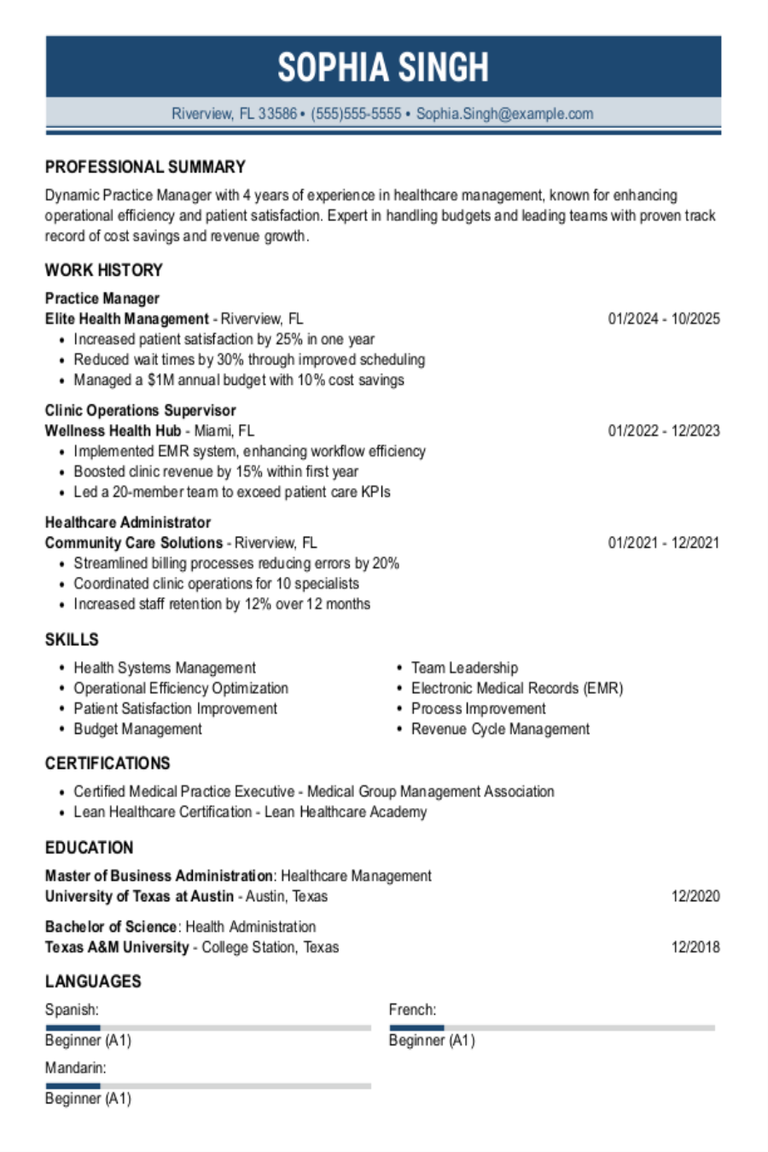
Practice Manager Resume Examples & Templates
Explore practice manager resume examples and tips to learn how to highlight your relevant skills and experience managing staff schedules and improving patient experiences.Build my resumeImport existing resumeCustomize this templateWhy

25 Interview Questions for Managers (With Answers & Tips)
Success in a management interview starts long before the conversation begins. Taking the time to prepare thoughtful responses to common interview questions for managers helps you clearly communicate leadership experience
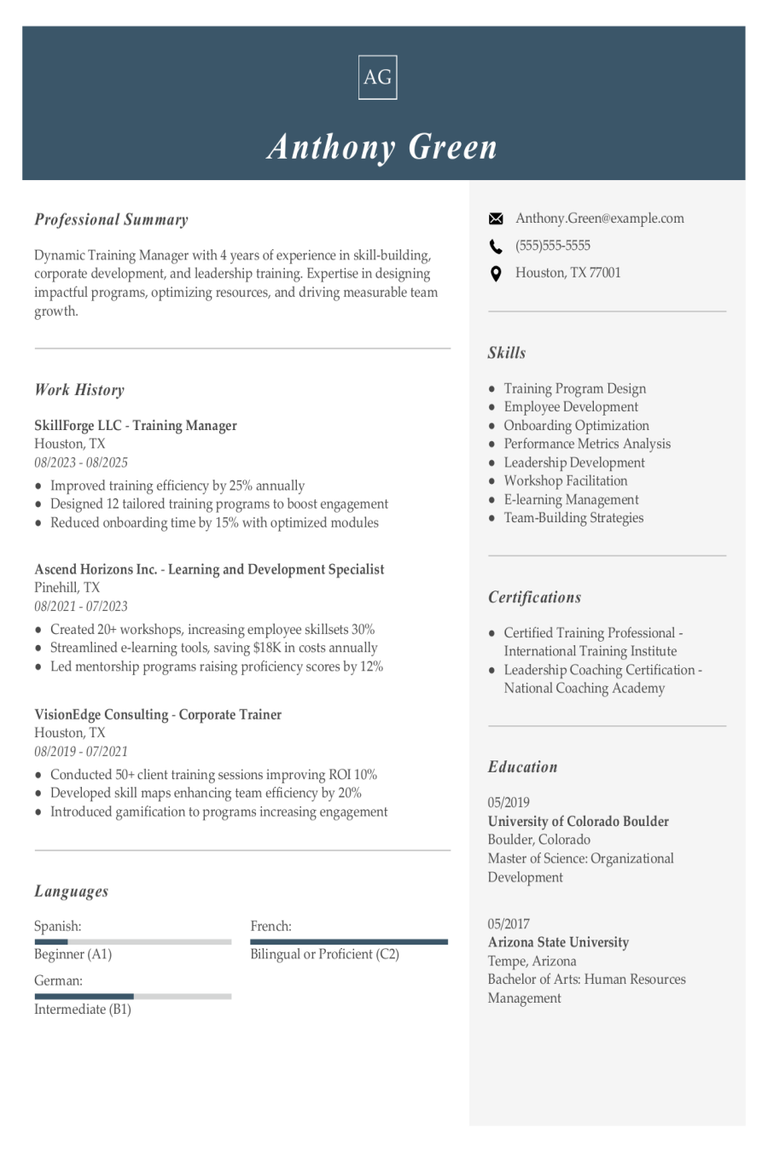
Training Manager Resume Examples & Templates
Discover how training managers showcase their skills in leading workshops and improving employee performance on their resumes. Our examples and tips will help you craft a resume that stands out
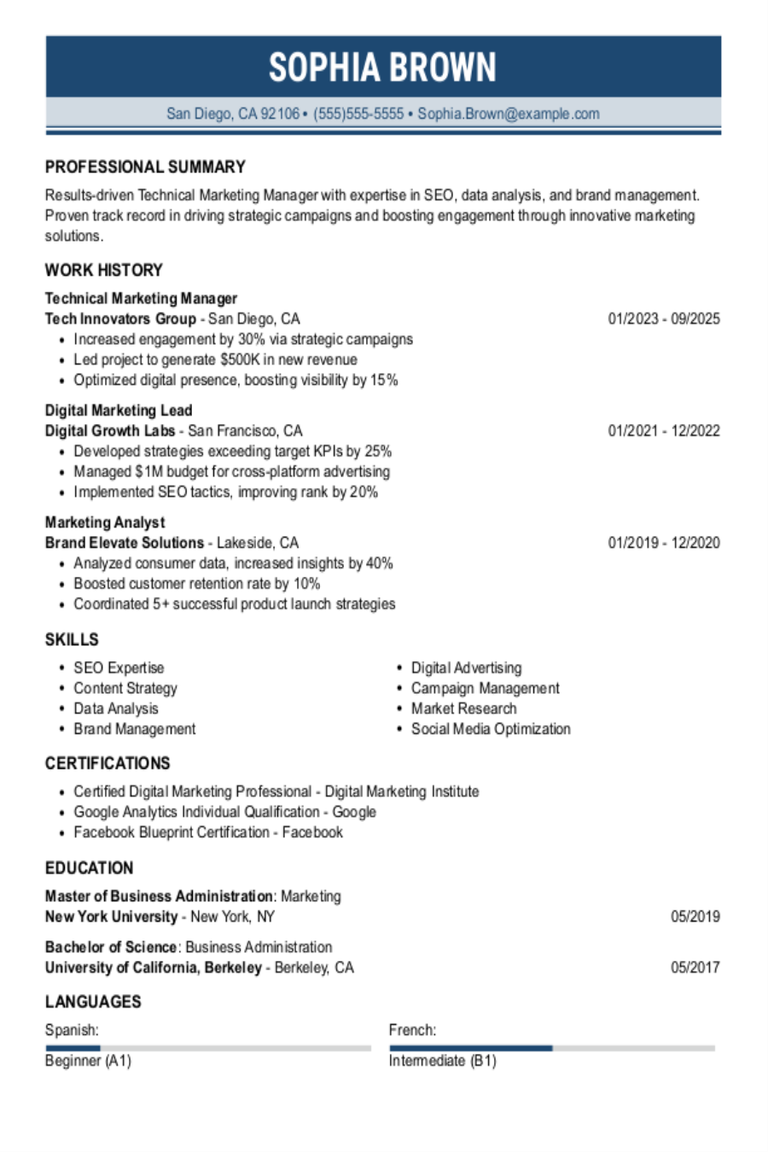
Technical Marketing Manager Resume Examples & Templates
Discover how to craft a technical marketing manager resume that shines. Learn to highlight your tech-savvy skills, marketing strategies, and project successes effectively.Build my resumeImport existing resumeCustomize this templateWhy this
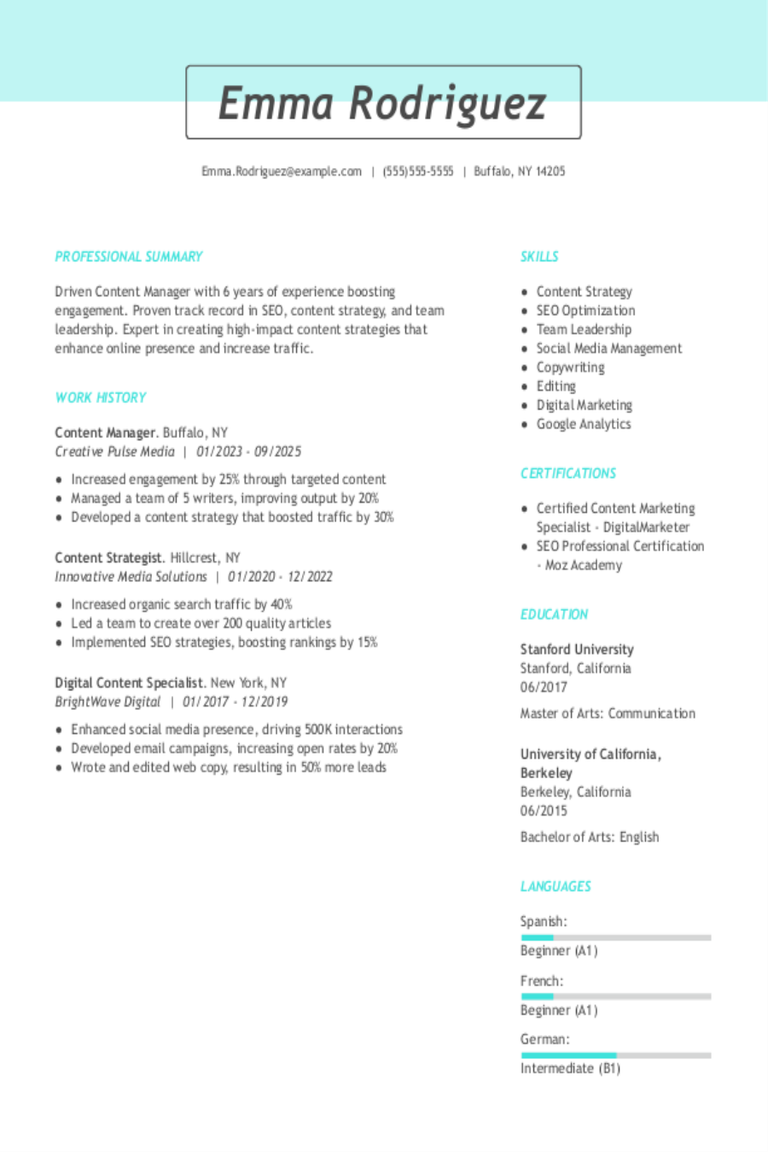
Content Manager Resume Examples & Templates
Browse content manager resume examples to see how to highlight your experience organizing, creating, and sharing engaging materials across platforms. These examples and tips help you showcase creativity, leadership, and
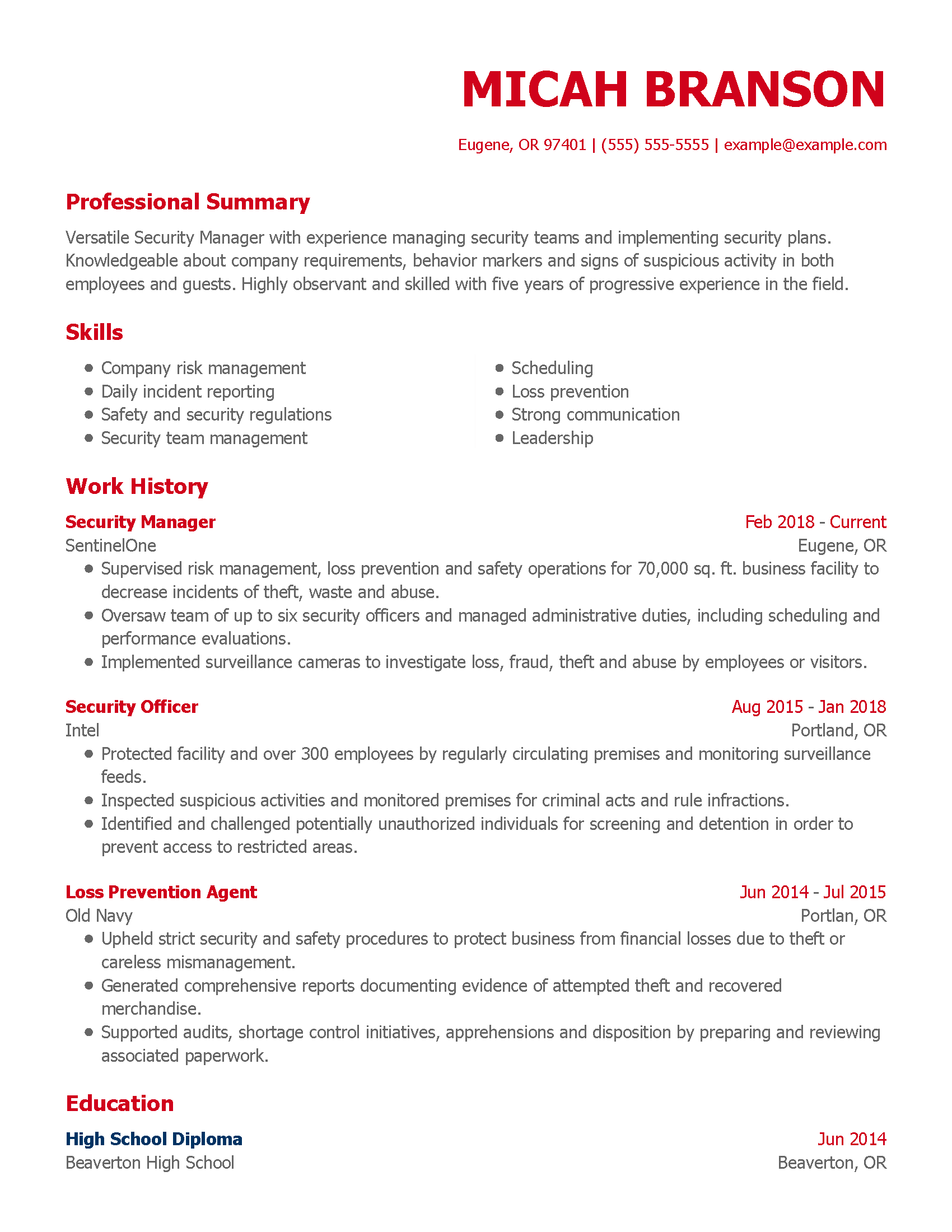
Security Manager Resume Examples & Templates
Explore security manager resume examples that showcase leadership, emergency response, and risk management. Get tips to highlight your skills and experience in keeping people and property safe.Build my resumeImport existing
